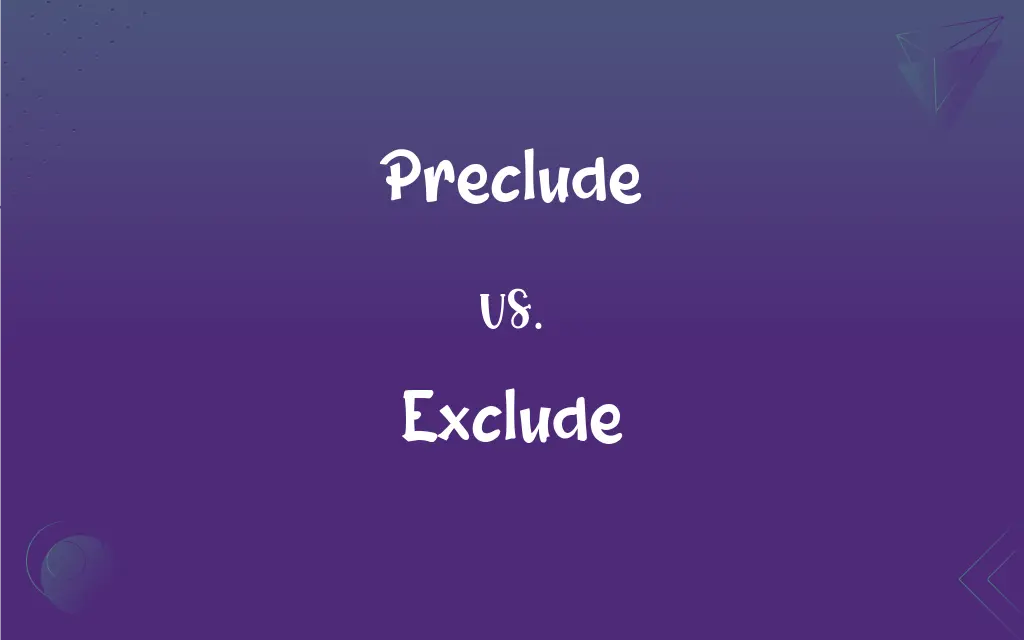Preclude vs. Exclude: What's the Difference?
Edited by Aimie Carlson || By Janet White || Published on January 26, 2024
Preclude refers to prevent something from happening. Exclude refers to deliberately leave something or someone out.

Key Differences
Preclude means to prevent or make impossible in advance, often due to an external factor or condition. Exclude, on the other hand, refers to the act of deliberately leaving something or someone out from a group or situation.
Preclude implies a preventative action, often based on preceding conditions or circumstances. Exclude specifically involves the act of not including or considering part of a group or category.
Preclude often has the connotation of a barrier or obstacle that makes an outcome impossible. Exclude suggests an active choice or decision to leave something out or not to consider it.
Preclude is typically used in scenarios where external factors prevent an occurrence. Exclude is used when there is an element of selectivity or decision-making involved in not including someone or something.
The concept of preclusion is more about creating an impossibility due to existing conditions. Exclusion, in contrast, is more about the act of leaving out or not including as part of a decision-making process.
ADVERTISEMENT
Comparison Chart
Nature of Action
Preventative, often involuntary
Deliberate, involves choice
Context of Usage
Situations with barriers
Situations requiring selection
Implication
Impossibility due to conditions
Active omission
Connotation
Barrier or obstacle
Selectivity, decision-making
Typical Scenarios
External factors preventing
Decision to not include
ADVERTISEMENT
Preclude and Exclude Definitions
Preclude
Act of making something impossible beforehand.
The agreement precludes any further negotiations.
Exclude
To deliberately leave out or omit.
The policy excludes people over the age of 50.
Preclude
To make impossible by previous action.
The heavy rain precluded the possibility of an outdoor wedding.
Exclude
To bar someone from participation.
Members who break rules will be excluded from the club.
Preclude
Prevent occurrence due to existing conditions.
His contract precludes him from working with competitors.
Exclude
Prevent from entering or being a part.
She was excluded from the team due to her injury.
Preclude
To rule out in advance.
Limited funding precluded the expansion of the program.
Exclude
Act of not considering or including.
The study excludes data from after 2020.
Preclude
To stop something from happening.
Security measures precluded unauthorized access.
Exclude
To keep out deliberately.
The system is designed to exclude errors.
Preclude
To make impossible, as by action taken in advance; prevent.
Exclude
To prevent from entering; keep out; bar
A jar sealed to exclude outside air.
An immigration policy that excludes undesirables.
Preclude
To exclude or prevent (someone) from a given condition or activity
Modesty precludes me from accepting the honor.
Preclude
(transitive) Remove the possibility of; rule out; prevent or exclude; to make impossible.
It has been raining for days, but that doesn’t preclude the possibility that the skies will clear by this afternoon!
Preclude
To put a barrier before; hence, to shut out; to hinder; to stop; to impede.
The valves preclude the blood from entering the veins.
Preclude
To shut out by anticipative action; to prevent or hinder by necessary consequence or implication; to deter action of, access to, employment of, etc.; to render ineffectual; to obviate by anticipation.
This much will obviate and preclude the objections.
Preclude
Keep from happening or arising; have the effect of preventing;
My sense of tact forbids an honest answer
Preclude
Make impossible, especially beforehand
FAQs
Is exclude always negative?
Not necessarily, it depends on the context and intention.
What types of situations use preclude?
Scenarios where external factors make an outcome impossible.
What does preclude mean?
To prevent something from happening due to prior conditions or factors.
Can preclude be used in legal contexts?
Yes, it's often used to describe conditions that prevent certain legal actions.
Can preclude be synonymous with prohibit?
In some contexts, yes, as both imply prevention.
How is exclude used in a sentence?
Exclude refers to deliberately leaving out or omitting something.
Is exclude specific to social contexts?
No, it can be used in various contexts, including social, technical, and academic.
Is preclude a common legal term?
Yes, especially in contracts and agreements.
Does preclude relate to timing?
Yes, it often involves actions or conditions set in place before an event.
Does exclude imply intention?
Yes, it involves a decision or choice to leave out.
Can something be excluded accidentally?
Typically, exclusion implies a deliberate action.
What's an example of preclude in a sentence?
Her absence precluded her from being considered for the award.
How does exclude affect group dynamics?
It can create feelings of separation or discrimination.
Can exclude be used in a positive way?
Yes, like excluding harmful substances from a product.
In what scenarios is exclude most commonly used?
In situations requiring selectivity, like memberships or data selection.
Can preclude be reversible?
It depends on the context, but often it's not easily reversible.
Do preclude and prevent have the same meaning?
They are similar, but preclude often implies a more specific set of preventing conditions.
Is exclude a choice?
Yes, it involves making a conscious decision to leave out.
Does preclude imply a lack of control?
It can, as it often relates to conditions out of one's control.
Can exclude be inclusive in any context?
In a broader sense, like excluding negativity to create a positive environment.
About Author
Written by
Janet WhiteJanet White has been an esteemed writer and blogger for Difference Wiki. Holding a Master's degree in Science and Medical Journalism from the prestigious Boston University, she has consistently demonstrated her expertise and passion for her field. When she's not immersed in her work, Janet relishes her time exercising, delving into a good book, and cherishing moments with friends and family.
Edited by
Aimie CarlsonAimie Carlson, holding a master's degree in English literature, is a fervent English language enthusiast. She lends her writing talents to Difference Wiki, a prominent website that specializes in comparisons, offering readers insightful analyses that both captivate and inform.







































































